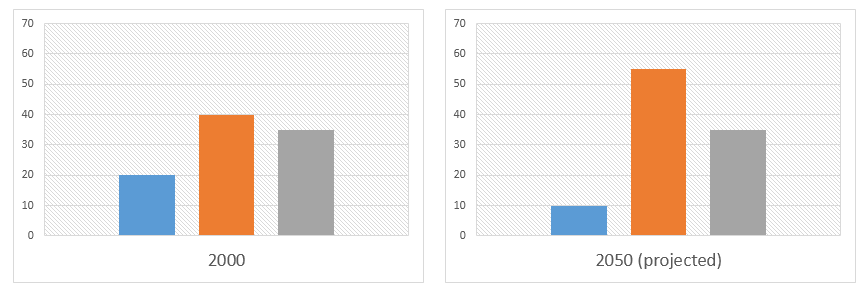You should spend about 20 minutes on this task.
The graphs below show the figures for population distribution in a country for 1900-2050.
Summarise the information by selecting and reporting the main features, and make comparisons where relevant.
Sample Answer:
The column graphs compare the populations in rural, suburban and urban areas in a country in three different years and also give a projection for the year 2050. As can be seen from the graphs, more percentages of people started living in the suburban and urban areas in 2000 and in the future, the highest percentage of them in this country would be living in city areas.
As can be seen from the graphs, around 62% population in that country lived in rural areas in 1900 while above 31% lived in urban areas. Only 7% of them lived in suburban areas. This population distribution kept on changing and more percentages of people started living in urban and suburban areas. After 50 years, the village living population dropped to over 45% while the remaining 55% started living in city and metropolitan areas. In the year 2000, 80% citizens lived in city areas while only 20% of them were located in rural areas. The future projection estimates that every one out of two persons in 2050 will live in suburban areas while one in every three persons would be in urban areas. In this year less than 10% people will live in rural areas which reveal an exactly opposite scenario in terms of the population distribution of 1900.


I Provide Coaching For IELTS.
Hi, I’m taking my IELTS exam after 5 days. How can I eliminate god damned fear of doing listening as well as reading?? Please contact as soon as possible.
Good.
Nice Article. Thanks for sharing the information. Keep sharing information!
Hi, I need a good communicator for IELTS topics. I will be happy if you are waiting for me. I just wanna grab new knowledge and enhance my speaking skills. I need a good speaker with a good accent. I experienced IETLS exam so I can reveal more stuff for you guys. My WhatsApp number is +918699225120.